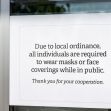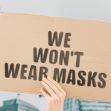President Joe Biden’s Executive Order enacted during his first day in office, ‘Protecting the Federal Workforce and Requiring Mask-Wearing,' imposes a powerful mandate on all federal buildings, lands, and staff to wear masks.
The Centers for Disease Control and Prevention (CDC) emphatically endorses mask-wearing to block the spread of COVID-19, which is transmitted via respiratory droplets from infected people as they talk, breathe, cough, etc. Many people are asymptomatic and pass along the deadly virus when they do not wear a mask or social distance.
Yet millions of Americans, many of whom followed former President Trump in his refusal and even cynicism about wearing masks or social distancing, are disregarding science. Choosing to ignore scientific evidence by not wearing masks might infect many thousands of people, but this action is not illegal. There are no federal laws that impose mask mandates at the state or local level.
As of today, over 425,000 Americans have died from the virus. Now, it’s getting worse.
Scientists predict a dramatic surge in COVID-19 cases and up to ten times the COVID-19 deaths due to a new, extremely contagious variant of the Coronavirus now ravaging England and other countries.
Biden’s mask order that protects those in federal buildings or on federal lands does not extend to the general public outside of federal property or federal employees. Such a mandate would not be legal.
The US Constitution’s 10th Amendment and numerous Supreme Court decisions make it clear that state governments have the authority to manage diseases within their jurisdiction.
Although the US Constitution might not specifically address the legality of a national mask mandate, numerous health and safety laws muddy the waters.
Section 361 of the Public Health Service Act addresses short-term quarantines and federal authority to combat diseases, but courts would most likely decide a national mask mandate would not be legal due to the rights of states under the 10th Amendment. Citizens might cite religious freedom as well, as seen already in individual states where mandatory mask-wearing has been imposed.
Biden would need to cite a Constitutional power or legislative authority to force states to mandate mask-wearing by all residents.
The Public Service Act (PSA) states, “the Secretary of Health and Human Services (HHS) through the U.S. Centers for Disease Control and Prevention has the authority … to prevent the introduction, transmission, or spread of communicable diseases from foreign countries.”
Biden could work with the CDC to introduce a national mandate using the PSA.
Another method to get federal mask-wearing laws passed is if Congress would use its authority under the Commerce Clause. This power has historically been interpreted to grant Congress broad powers to legislate in any area that touches on interstate commerce. Congress could, in theory, require anyone working in a business to wear a mask.
Another method Congress might use to mandate national mask-wearing would be via the Spending Clause. This clause empowers Congress “to tax and spend for the general welfare.” The clause could conceivably tie the ability of states to receive federal funds to their passage of a statewide mask mandate.
A recent Congressional Research Service document states, “Applying this authority in the context of a mask mandate, Congress could incentivize states to enact a mask mandate meeting specific federal requirements by imposing it as a condition of receiving certain federal funds.
Even if Biden found solid footing for a Constitutional power for national mask-wearing, or Congress acted to force anyone in the US working in interstate commerce to wear masks or tied federal funding to states based upon their local mask laws, there would still be the practical matter of enforcing the law.
Martial Law is the most aggressive tool Biden could use to implement a stay-at-home order or mask-wearing. President Lincoln enacted martial law nationwide with congressional approval during the American Civil War.
States can also impose martial law but would might face opposition in the courts due to a mask mandate violating Constitutional provisions.
With all roads leading to court challenges, mandating a national mask law seems unlikely.






